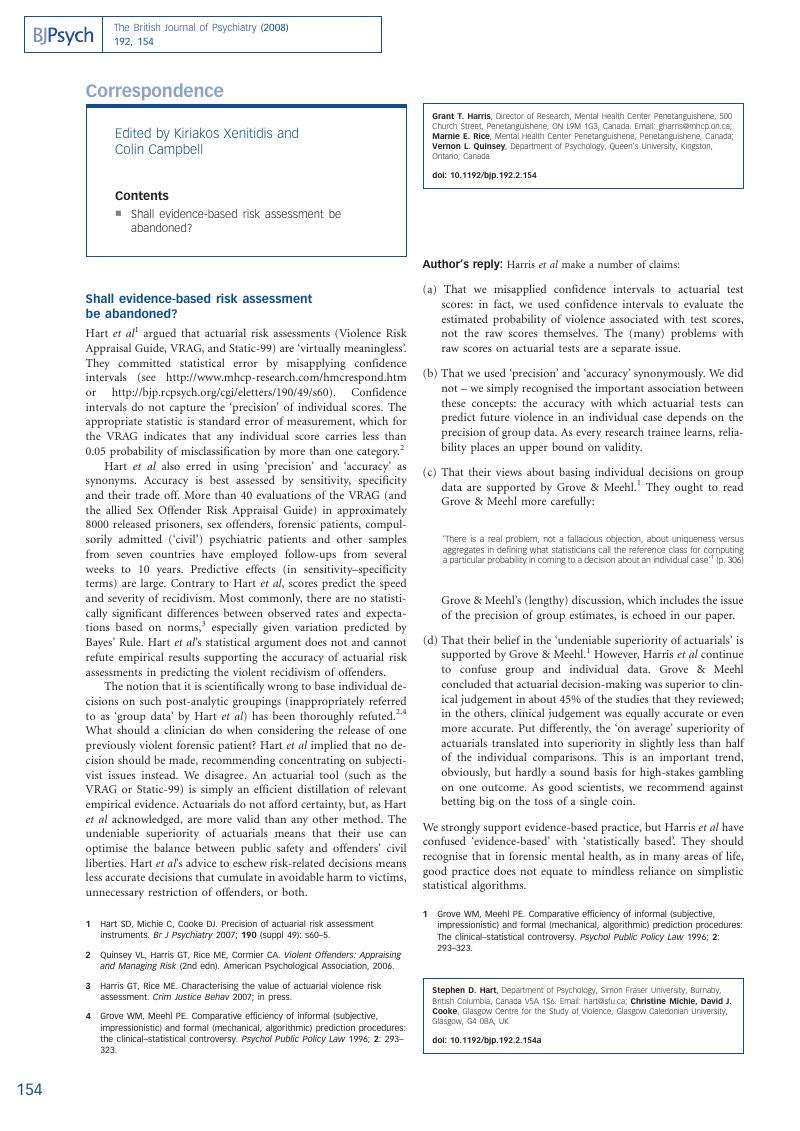Crossref Citations
This article has been cited by the following publications. This list is generated based on data provided by Crossref.
Scalora, Mario J.
2009.
Mental Disorder and Criminal Law.
p.
179.
Barnett, Georgia D.
Wakeling, Helen C.
and
Howard, Philip D.
2010.
An Examination of the Predictive Validity of the Risk Matrix 2000 in England and Wales.
Sexual Abuse: A Journal of Research and Treatment,
Vol. 22,
Issue. 4,
p.
443.
Lloyd, Caleb D.
Clark, Heather J.
and
Forth, Adelle E.
2010.
Psychopathy, expert testimony, and indeterminate sentences: Exploring the relationship between Psychopathy Checklist‐Revised testimony and trial outcome in Canada.
Legal and Criminological Psychology,
Vol. 15,
Issue. 2,
p.
323.
Nguyen, Annie H.
Acklin, Marvin W.
Fuger, Kristen
Gowensmith, W.N.
and
Ignacio, Lawrie A.
2011.
Freedom in paradise: Quality of conditional release reports submitted to the Hawaii judiciary.
International Journal of Law and Psychiatry,
Vol. 34,
Issue. 5,
p.
341.
Vess, James
and
Ward, Tony
2011.
Forensic Case Formulation.
p.
173.
Vess, James
2011.
Ethical Practice in Sex Offender Assessment.
Sexual Abuse,
Vol. 23,
Issue. 3,
p.
381.
Doyle, Dominic J.
Ogloff, James R.P.
and
Thomas, Stuart D.M.
2011.
An Analysis of Dangerous Sexual Offender Assessment Reports: Recommendations for Best Practice.
Psychiatry, Psychology and Law,
Vol. 18,
Issue. 4,
p.
537.
Wakeling, Helen Catherine
Howard, Philip
and
Barnett, Georgia
2011.
Comparing the Validity of the RM2000 Scales and OGRS3 for Predicting Recidivism by Internet Sexual Offenders.
Sexual Abuse,
Vol. 23,
Issue. 1,
p.
146.
Eher, Reinhard
Schilling, Frank
Haubner-MacLean, Tanja
Jahn, Thomas
and
Rettenberger, Martin
2012.
Ermittlung des relativen und absoluten Rückfallrisikos mithilfe des Static-99 in einer deutschsprachigen Population entlassener Sexualstraftäter.
Forensische Psychiatrie, Psychologie, Kriminologie,
Vol. 6,
Issue. 1,
p.
32.
Hart, Stephen D.
and
Cooke, David J.
2013.
Another Look at the (Im‐)Precision of Individual Risk Estimates Made Using Actuarial Risk Assessment Instruments.
Behavioral Sciences & the Law,
Vol. 31,
Issue. 1,
p.
81.
Neller, Daniel J.
and
Frederick, Richard I.
2013.
Classification Accuracy of Actuarial Risk Assessment Instruments.
Behavioral Sciences & the Law,
Vol. 31,
Issue. 1,
p.
141.
Neller, Daniel J.
and
Petris, Giovanni
2013.
Sexually Violent Predators: Toward Reasonable Estimates of Recidivism Base Rates.
Behavioral Sciences & the Law,
Vol. 31,
Issue. 4,
p.
429.
Judge, Joe
Quayle, Ethel
O'Rourke, Suzanne
Russell, Katharine
and
Darjee, Rajan
2014.
Referrers' views of structured professional judgement risk assessment of sexual offenders: A qualitative study.
Journal of Sexual Aggression,
Vol. 20,
Issue. 1,
p.
94.
Imrey, Peter B.
and
Dawid, A. Philip
2015.
A Commentary on Statistical Assessment of Violence Recidivism Risk.
Statistics and Public Policy,
Vol. 2,
Issue. 1,
p.
1.
Harris, Grant T.
Lowenkamp, Christopher T.
and
Hilton, N. Zoe
2015.
Evidence for Risk Estimate Precision: Implications for Individual Risk Communication.
Behavioral Sciences & the Law,
Vol. 33,
Issue. 1,
p.
111.
Mokros, Andreas
2015.
Psychiatrische Begutachtung.
p.
29.
Rice, Marnie E.
and
Harris, Grant T.
2016.
Sexual Offending.
p.
471.
Monahan, John
and
Skeem, Jennifer L.
2016.
Risk Assessment in Criminal Sentencing.
Annual Review of Clinical Psychology,
Vol. 12,
Issue. 1,
p.
489.
Dawid, Philip
2017.
On individual risk.
Synthese,
Vol. 194,
Issue. 9,
p.
3445.
McGuire, James
2017.
Assessments in Forensic Practice.
p.
137.






eLetters
No eLetters have been published for this article.